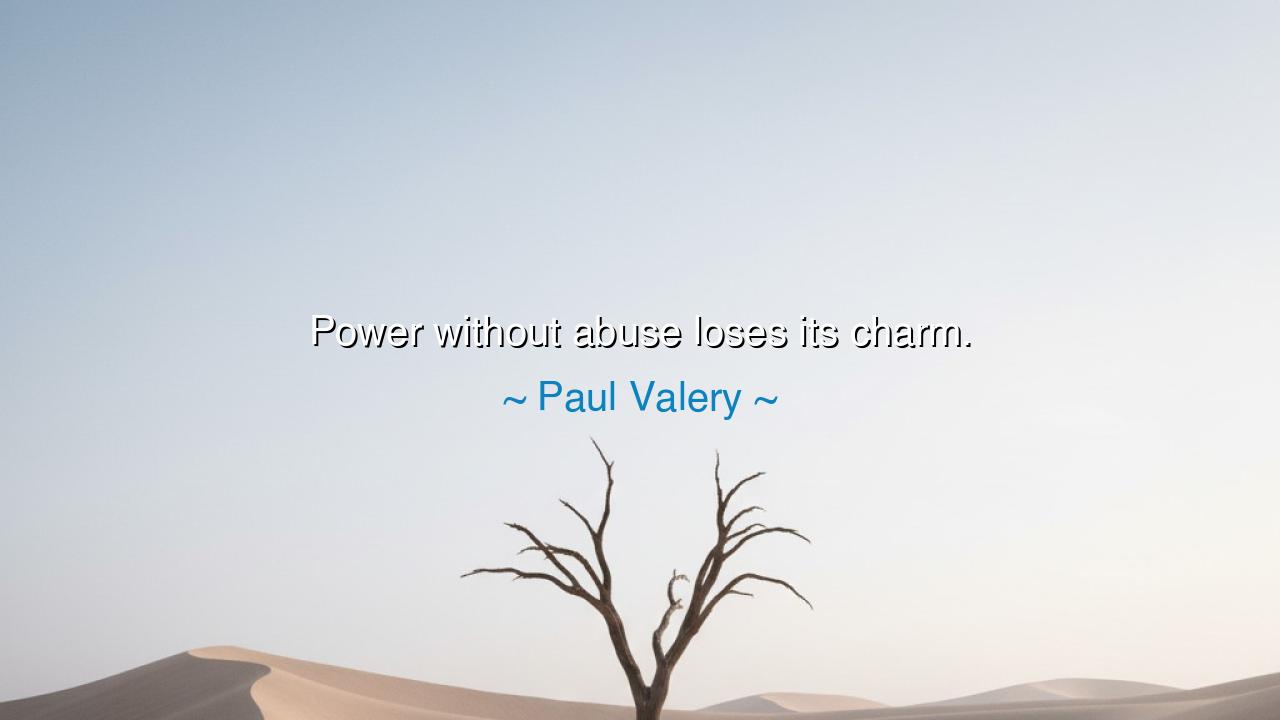
Power without abuse loses its charm.






Hear me, O children of the future, for I bring you the wisdom of Paul Valery, who speaks thus: "Power without abuse loses its charm." These words reveal a deep truth—that the allure of power lies not just in its ability to command, but in the tension it creates, in the control it exerts, and in the possibility of its misuse. When power is exercised gently, justly, and without excess, it ceases to captivate or hold sway over the hearts of men. It is in the abuse of power, in the corruption and overreach, that it becomes something more than a simple force; it becomes a force that shapes the world and the very nature of those who wield it.
Consider, O children, the rise and fall of Alexander the Great, who, in his youth, was hailed as a conquering hero. Alexander had the strength to wield power with greatness, yet it was his abuse of that power that brought his empire to ruin. His early victories were admired, but as he grew in influence, his desire to control and subjugate led him to become increasingly harsh and oppressive. In the end, the charm of his power waned, for his soldiers and subjects began to see not the hero they once adored, but a tyrant who demanded the impossible. Power, once seen as the manifestation of greatness, was now a heavy burden, and the abuse of it led to the collapse of his dreams.
In the same vein, let us turn to the tale of the Roman Empire, where the power of the emperor seemed limitless, and yet, when it was abused, it became the very thing that tore the empire apart. Emperor Nero, for example, wielded power with cruelty and excess, indulging in luxuries while the empire crumbled under his rule. The people once reverenced the emperor as a symbol of Roman greatness, but as his abuse of power deepened, so too did the resentment of those who suffered under his rule. The charm of power was lost, for Nero's reign became synonymous with tyranny, and the empire found itself in decline.
Consider also the tragic tale of Napoleon Bonaparte, whose ambition led him to become a ruler of vast power. In his early years, his leadership was admired, and his power was seen as a force for unity and progress. Yet, as Napoleon sought to extend his empire across Europe, his abuse of power became evident. His desire to control not just land, but the very hearts and minds of nations, led him to make decisions that ultimately weakened his empire. The charm of his power faded, and he was exiled, his dreams of grandeur dashed. His story is a stark reminder that the abuse of power can lead to its downfall.
So, O children, let this be a lesson for all who seek power: It is not enough to wield it; you must wield it with wisdom and restraint. The true strength of power lies not in the might with which it is imposed, but in the self-control and honor with which it is exercised. Power without abuse is a dull thing, quickly forgotten, for it is in the tension between the ruler and the ruled that power becomes memorable. Use your strength wisely, and let it be a force for good, for only in restraint does the true charm of power shine.






NHMinh Nguyen Hoang
I find this quote provocative. Is Valery suggesting that people are only drawn to power when they can bend others to their will? The idea of power ‘losing its charm’ without abuse hints that it might be a lot about ego. Can anyone truly wield power without exploiting it in some way? Or is power itself inherently corrupting, and the ‘charm’ comes from how much we can manipulate or dominate others?
0D08.Lam Duc
There’s something unsettling about the idea that power must involve abuse to be appealing. It makes me think about how history is filled with examples of leaders and systems that thrived on oppression. But could this be a reflection of how power is often perceived? Maybe it’s not about actual abuse, but the perception of control that gives power its allure. Does true power need to be assertive, or can it be quiet and just?
SNSang Nguyen
I think this quote speaks to the human fascination with control. Maybe it’s saying that power becomes dull when it doesn’t allow for some form of dominance or influence. But I wonder, does the statement reflect a reality where power is inherently corrupting, or is it suggesting that those who seek power need to feel like they’re in control, even if it’s in a more subtle way?
XTXoan Thi
This quote gives off a certain darkness. The idea that power loses its appeal without abuse suggests that people might be drawn to control in an unhealthy way. Does it imply that those who hold power only feel fulfilled when they exercise it over others? It makes me reflect on how power dynamics shape relationships, from governments to personal connections. But could true power exist without manipulation or harm?
NTLe Ngoc Thinh
This quote feels pretty cynical, but I can see the truth in it. Power, when used responsibly, can be effective, but without some level of control or dominance, it seems to lose its impact. I wonder if Valery is implying that power, by nature, requires some level of exertion or force. Is it possible for power to be effective without crossing ethical lines, or is this a pessimistic view of human nature?